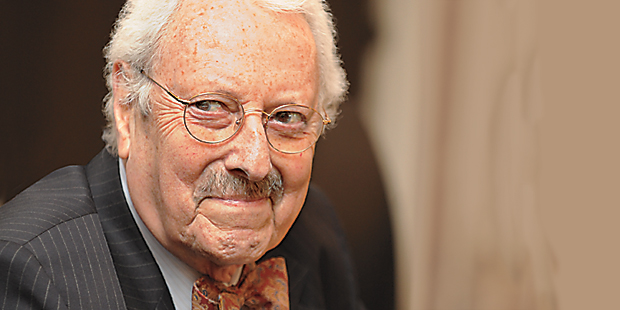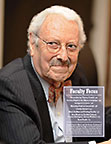Thomas Franck, 1931-2009
Colleagues and his longtime assistant remember a beloved and distinguished professor on the faculty since 1960.
Printer Friendly VersionBefore I entered the legal academy, I knew Tom Franck only as the éminence grise of public international law. He was thoroughly intimidating, and not only because he wore bow ties. No one else managed to be editor in chief of the leading peer-reviewed journal in the field while still producing pathbreaking books at breakneck speed.
In 1991 I attended a summer workshop for young international law and international relations teachers. Tom’s model of engaged advocacy for ordering the world on the basis of the rule of law so thoroughly captivated our interdisciplinary group that at our closing dance we improvised a new step, the “compliance pull,” in tribute to Tom’s response to why “powerful nations obey powerless rules” in what was then his latest book, The Power of Legitimacy Among Nations.
Over the years Tom became a friend, but he never ceased to intimidate me by virtue of his achievements. In addition to producing, on average, one book every 17.8 months for 43 years, Tom became the confidant of governments and secretaries general. He pushed the American Society of International Law to deepen its commitment to scholarship (eventually he became ASIL president), and he mentored hundreds of students, many of whom became leading lights in practice, government, or academe. Of course, Tom came into his own shortly after 9/11, when he courageously voiced support for law and multilateral cooperation when few, particularly in our government, were inclined to listen.
When I became president of ASIL, there was no doubt whose example I would seek to follow. I tried to emulate Tom’s wit—as when he reimagined the society 100 years hence as a wholly owned subsidiary of the Chinese Society of International Law. I sought to make an esoteric, technical field accessible and to cross political and legal (and not just disciplinary) divides, as he did. To this day, his is the fellow émigré’s voice I hear when I teach a class, comment on a colleague’s work, give students advice, or try to make someone understand what the law means and why it matters.
We all need someone like Tom to make us do our best and to teach us how to face life’s challenges with equanimity, courage, and poise. He died as he lived. In his last weeks he was engaged in planning for next semester’s U.N. class, assisting yet another government before the World Court, and giving talks on his latest tour de force (an article that uses proportionality to examine everything from trade to human rights). Just days before he passed away, he dragged himself from his sickbed to join in a tribute to his retiring colleague Andreas Lowenfeld. In a gesture that typifies his irrepressible efforts to bridge academe and politics, he used that occasion to remind us, movingly, of the as yet unfulfilled dreams of those who seek to use law to achieve a more just world. Looking at Harold Koh, the Obama administration’s nominee to be Secretary of State Clinton’s top lawyer, he asked whether it was “too late” to achieve that world. Koh responded by saying that it was not. It was to be Tom’s last message to those with power.—José Alvarez, Herbert and Rose Rubin Professor of International Law
Professor Franck was more than my boss for 44 years; he was a part of my family and my friend. Working with him was a joy and a learning experience.
I fondly remember being invited with my husband to accompany Tom to the University of British Columbia when he received his LL.D. So that we could see the beautiful city of Vancouver, where he grew up, Tom borrowed a friend’s car and spent two days showing us the sights. Sherwin and I also travelled to The Hague, where I spent two weeks working with Tom on his Chad v. Libya case before the International Court of Justice. The Hague is where Tom introduced us to Indonesian food. Wonderful memories!
Tom took tremendous pride in the achievements of his students. He was excited to hear when one was accepted to a clerkship, pursued an advanced degree, landed a prestigious job in government or a faculty appointment, or when one was honored with the Nobel Peace Prize. He felt the pride of a father. I admired most how Tom extended himself on behalf of his students. I will surely miss Tom, but I will always have a smile on my face when thinking of him.— Shelley Fenchel
In one of his last publications, Tom writes of the beginning of his career as a research assistant to the legendary international law professor Louis Sohn. Tom was struck by the collection of giraffes that Sohn kept in his office and home to remind him that it was possible to keep one’s head in the clouds while keeping one’s feet firmly planted on the ground. I think that also describes Tom perfectly.
We were friends, to some extent rivals, and on most issues, we thought alike. Interestingly enough, we differed several times on issues of U.S. constitutional law. To take just one instance, at the time that the U.S. government wanted to get out of the Mutual Defense Treaty with the Republic of China (Taiwan), Tom and I were both asked to testify before the Senate Foreign Relations Committee on whether it was the president or the Senate that had the authority to terminate a treaty. Tom argued that since the Senate had given its advice and consent to making a treaty, it had to give its advice and consent to unmaking or withdrawing from it. I said the president makes treaties, and so the president must be able to unmake them. Government lawyers faced with such a question too often look first to the answer desired, then develop an argument to support it. For Tom it was not only possible but fundamentally ethical to address the question without regard to how one felt about Taiwan or the Defense Treaty.
Tom Franck will be best remembered for his seminal work at the frontier of law and philosophy—explorations of legitimacy, fairness, impartiality, proportionality, and the use and abuse of force. But like the giraffe in his mentor’s study, he could plant his feet firmly on the ground as well.—Andreas Lowenfeld, Herbert and Rose Rubin Professor of International Law Emeritus
Tom Franck’s exceptional contributions to international law—as scholar, teacher, mentor, advocate, and judge—have been widely and justly recognized. Tom also deserves to be honored for his powerful influence on the NYU School of Law.
From the time I met him, soon after my appointment to the faculty, he was a key participant in the long process of transforming NYU from a good regional law school to the world-class institution it is today. He demanded quality in his own work, and he had high expectations for his colleagues. Thus, Tom was the obvious person to present the paper at the first faculty workshop, which younger members of the faculty instituted in the early 1960s. And, among many other activities, he served with distinction on the committee that formulated the plan for what became the Hauser Global Law School Program.
In short, Tom was for the Law School what in baseball is called an impact player—he brought luster to us all through intellect, character, and dedication. He cannot be replaced.—Norman Dorsen, Frederick I. and Grace A. Stokes Professor of Law
—
All 2009 Features
All of 2009 Faculty Focus


 Multimedia
Multimedia